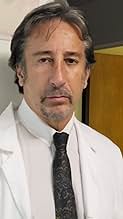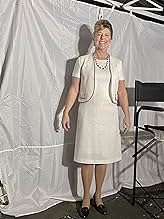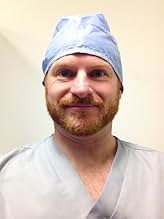1969. Dr. Audrey Evans joins world-renowned children's hospital and battles sexism, medical conventions, and the subterfuge of her peers to develop revolutionary treatments and purchase the ... Read all1969. Dr. Audrey Evans joins world-renowned children's hospital and battles sexism, medical conventions, and the subterfuge of her peers to develop revolutionary treatments and purchase the first Ronald McDonald House, impacting millions.1969. Dr. Audrey Evans joins world-renowned children's hospital and battles sexism, medical conventions, and the subterfuge of her peers to develop revolutionary treatments and purchase the first Ronald McDonald House, impacting millions.
- Awards
- 4 wins & 6 nominations total
- Director
- Writer
- All cast & crew
- Production, box office & more at IMDbPro
Featured reviews
I felt that the film was very well balanced. It showed the complexity's of being a woman in a male dominated environment. Her compassion for the children and their parents was self evident. I also liked how easily she could subvert or coerce people to her side. The opening scene of the movie tell you everything you really need to know about her personality. Her tenacity is a blessing and a curse. At times, she doesn't know when to take her foot off the gas pedal and apply the brakes. My only complaint is that I would love to have seen a little bit more of her personal life during this Period. As a Philadelphian I'm a Lil was ashamed that I didn't know anythingabout her.
Greetings again from the darkness. Firefighters, Police Officers, and Armed Forces soldiers and veterans are the ones we usually (and rightfully) describe as heroes; yet heroism can also be found in the actions of everyday people. Director Ami Canaan Mann and screenwriter Julia Fisher Farbman introduce us to one such hero in this biopic on Dr. Audrey Evans.
Natalie Dormer ("Game of Thrones") stars as Dr. Evans (the titular Audrey), a remarkable woman behind advancements in pediatric oncology, and also the founder of the first Ronald McDonald House. The film opens in 1969 as Dr. Evans begins her tenure at Children's Hospital of Philadelphia (CHOP). Having trained under Dr. Sidney Farber, she immediately ruffles feathers by pushing the envelope on funding and research for her department. Chief Surgeon, Dr C Everett Koop (Clancy Brown, THE SHAWSHANK REDEMPTION, 1994) recruited her and almost immediately had to deal with her unorthodox approach ... and the complaints from Dr. Jeremy Lewis (Ben Chase, "Law and Order: Organized Crime"). Dr. Lewis is quite put out with this assertive woman going outside the norm to get her way.
It's inspiring to watch the determination with which Dr. Evans takes on all obstacles. Radiation expert, and steadfast rule follower, Dr. Dan Dangio (Jimmi Simpson, "Westworld") sees the potential in what Dr. Evans is pursuing and joins in the mission, as does Dr. Brian Faust (Brandon Michael Hall, "God Friended Me"). Their research methods are exhausting to watch - this was prior to computers, so not only did they have to comb through mounds of paper files, compiling results and drawing conclusions was even more excruciating.
The painstaking work led to the Evans Staging System for categorizing cancer in patients, and it also led to dramatic improvements in survival rates for kids with cancer. "Kids with cancer" ... can there be a more heartbreaking and depressing topic? Trust me, it's painful to see even in a movie. Bits of the movie seem somewhat contrived, especially her brief interactions with kids playing on the sidewalk, as well as with the Vietnam protestors. Additionally, her wardrobe seems incredible for a woman living in an apartment that likely had a 5-foot-wide closet at best. Still, Natalie Dormer delivers a nice performance as this remarkable woman.
It's 1974 when the Philadelphia Eagles owners are persuaded (by Dr Evans) to sponsor the Ronald McDonald House - a charity that, now 50 years later, has proved vital to so many children and families. Of course, the Dr. C. Everett Koop in this story went on to be serve as U. S. Surgeon General in the 1980s, and the full story of Dr. Evans and Dr. Dangio is also quite remarkable. Director Mann runs an interview with an elderly Dr. Evans over the closing credits, and aptly finishes things with Carole King singing "You've Got a Friend". It's always inspirational to learn the full story of real-life heroes, and the life of Dr. Audrey Evans is one we should continue to relish.
Opens in theaters on March 28, 2025.
Natalie Dormer ("Game of Thrones") stars as Dr. Evans (the titular Audrey), a remarkable woman behind advancements in pediatric oncology, and also the founder of the first Ronald McDonald House. The film opens in 1969 as Dr. Evans begins her tenure at Children's Hospital of Philadelphia (CHOP). Having trained under Dr. Sidney Farber, she immediately ruffles feathers by pushing the envelope on funding and research for her department. Chief Surgeon, Dr C Everett Koop (Clancy Brown, THE SHAWSHANK REDEMPTION, 1994) recruited her and almost immediately had to deal with her unorthodox approach ... and the complaints from Dr. Jeremy Lewis (Ben Chase, "Law and Order: Organized Crime"). Dr. Lewis is quite put out with this assertive woman going outside the norm to get her way.
It's inspiring to watch the determination with which Dr. Evans takes on all obstacles. Radiation expert, and steadfast rule follower, Dr. Dan Dangio (Jimmi Simpson, "Westworld") sees the potential in what Dr. Evans is pursuing and joins in the mission, as does Dr. Brian Faust (Brandon Michael Hall, "God Friended Me"). Their research methods are exhausting to watch - this was prior to computers, so not only did they have to comb through mounds of paper files, compiling results and drawing conclusions was even more excruciating.
The painstaking work led to the Evans Staging System for categorizing cancer in patients, and it also led to dramatic improvements in survival rates for kids with cancer. "Kids with cancer" ... can there be a more heartbreaking and depressing topic? Trust me, it's painful to see even in a movie. Bits of the movie seem somewhat contrived, especially her brief interactions with kids playing on the sidewalk, as well as with the Vietnam protestors. Additionally, her wardrobe seems incredible for a woman living in an apartment that likely had a 5-foot-wide closet at best. Still, Natalie Dormer delivers a nice performance as this remarkable woman.
It's 1974 when the Philadelphia Eagles owners are persuaded (by Dr Evans) to sponsor the Ronald McDonald House - a charity that, now 50 years later, has proved vital to so many children and families. Of course, the Dr. C. Everett Koop in this story went on to be serve as U. S. Surgeon General in the 1980s, and the full story of Dr. Evans and Dr. Dangio is also quite remarkable. Director Mann runs an interview with an elderly Dr. Evans over the closing credits, and aptly finishes things with Carole King singing "You've Got a Friend". It's always inspirational to learn the full story of real-life heroes, and the life of Dr. Audrey Evans is one we should continue to relish.
Opens in theaters on March 28, 2025.
The subject of this film, Dr. Audrey Evans, a pediatric oncologist at the Children's Hospital of Philadelphia (CHOP), is nothing short of inspirational. It's quite realistic to think of her as Mother Teresa with an MD. Like Mother Teresa, Evans was devoutly religious and believed deeply that she was put on earth to care for children.
The story begins in 1969, when Dr. Evans has been recruited to CHOP after spending a few years at the University of Chicago. Overcoming innumerable obstacles, she and a couple of colleagues eventually developed a staging system for neuroblastoma, the most common pediatric cancer. As a result of Dr. Evans' work, treating children with neuroblastoma for the first time could be customized based on the patient's disease stage. Dr. Evans sense of humanity and her complete devotion to her patients make the title of the film entirely accurate.
"Audrey's Children" grew out of an interview in 2017 conducted by Julia Fisher Farbman (who wrote the script here) and Dr. Evans for the Amazon series "Modern Hero." Farbman was so impressed by her subject that she produced this film, raising all the funds from private sources. Because of the shoestring budget, the film had a shooting schedule of 23 days.
A key strength here is the film's accuracy and intense attention to detail. After the "Modern Hero" interview, Farbman spent many hours with Dr. Evans, who passed away in 2022 at age 97. The story is historically accurate and meticulously told. The Oncology Department at CHOP has publicly endorsed the medical accuracy of the story.
When filming, Director Ami Canaan Mann was equally attentive to detail. To ensure that the story was visually grounded in the time period, she used 35mm Ektachrome film. (HBO's "Euphoria" and the film "Poor Things" used the same cinematic technique.) As a result, the colors here are highly saturated and very high-contrast by today's standards. The production design (Amber Unkle), set design (Kimitha Cashin) and costumes (Sarah Maiorino) are equally faithful to the period (1969-1974).
What keeps the film from soaring is the script. There's no dramatic tension anywhere to be found. While there are occasional references to the misogyny Dr. Evans endured, there's nothing here that really gives the story any momentum. The film labors under the additional burden of its overarching theme: childhood cancer. Capturing vignettes of families who know their children are going to die (the mortality rate for childhood cancer in 1969 was 90%) involves some very heavy lifting. Efforts to generate a propulsive narrative are further weighed down by a script that necessarily involves a lot of medical terminology. When the central scenes involve debating which clinical features define the four stages of neuroblastoma, the creative team and the audience clearly have their work cut out for them. Before seeing this film, purchasing a copy of the latest edition of "Taber's Cyclopedic Medical Dictionary" might prove to be a good investment.
I wish I could be more supportive of this admirable attempt to lionize a modern-day saint. I also wish the creative team had channeled their energies, their work ethic and their good will into a first-rate documentary. As a drama, this film doesn't do her justice.
The story begins in 1969, when Dr. Evans has been recruited to CHOP after spending a few years at the University of Chicago. Overcoming innumerable obstacles, she and a couple of colleagues eventually developed a staging system for neuroblastoma, the most common pediatric cancer. As a result of Dr. Evans' work, treating children with neuroblastoma for the first time could be customized based on the patient's disease stage. Dr. Evans sense of humanity and her complete devotion to her patients make the title of the film entirely accurate.
"Audrey's Children" grew out of an interview in 2017 conducted by Julia Fisher Farbman (who wrote the script here) and Dr. Evans for the Amazon series "Modern Hero." Farbman was so impressed by her subject that she produced this film, raising all the funds from private sources. Because of the shoestring budget, the film had a shooting schedule of 23 days.
A key strength here is the film's accuracy and intense attention to detail. After the "Modern Hero" interview, Farbman spent many hours with Dr. Evans, who passed away in 2022 at age 97. The story is historically accurate and meticulously told. The Oncology Department at CHOP has publicly endorsed the medical accuracy of the story.
When filming, Director Ami Canaan Mann was equally attentive to detail. To ensure that the story was visually grounded in the time period, she used 35mm Ektachrome film. (HBO's "Euphoria" and the film "Poor Things" used the same cinematic technique.) As a result, the colors here are highly saturated and very high-contrast by today's standards. The production design (Amber Unkle), set design (Kimitha Cashin) and costumes (Sarah Maiorino) are equally faithful to the period (1969-1974).
What keeps the film from soaring is the script. There's no dramatic tension anywhere to be found. While there are occasional references to the misogyny Dr. Evans endured, there's nothing here that really gives the story any momentum. The film labors under the additional burden of its overarching theme: childhood cancer. Capturing vignettes of families who know their children are going to die (the mortality rate for childhood cancer in 1969 was 90%) involves some very heavy lifting. Efforts to generate a propulsive narrative are further weighed down by a script that necessarily involves a lot of medical terminology. When the central scenes involve debating which clinical features define the four stages of neuroblastoma, the creative team and the audience clearly have their work cut out for them. Before seeing this film, purchasing a copy of the latest edition of "Taber's Cyclopedic Medical Dictionary" might prove to be a good investment.
I wish I could be more supportive of this admirable attempt to lionize a modern-day saint. I also wish the creative team had channeled their energies, their work ethic and their good will into a first-rate documentary. As a drama, this film doesn't do her justice.
Absolute incredible production. This story is so heartwarming!! Finally a movie hits theaters that makes you feel, inspires you, makes you want to do good for the world and never give up. The cast absolutely crushed, Natalie was fantastic. Audrey is a hero and the perfect sort of leader. She is funny, kind, smart, brave, strategic and caring. A female that I will always look up to and admire to be like. This film is a must see. This should make waves through the medical industry and re-inspire and reinvigorate doctors around the world. I hope this movie makes an International push as everyone in the world should be privy to this inspiring story. Well done to everyone that touched this project.
This was such an incredible movie. Dr. Evans overcame so much in her career to improve the lives of her children. Such a well done film, excellent movie from start to finish! Especially with the climate of political funding, this movie highlights the importance of critical medical research and the need for continued efforts to save the lives of children all over the world. Thank you, Dr. Evans for not giving up and for sharing your incredible mind. You truly were the greatest human and doctor! Thank you for working so hard to improve neuroblastoma treatment and outcomes. And lastly, thank you Julia Fisher Farbman for such a beautiful film!
Did you know
- TriviaFilmed in 23 days.
- GoofsSeveral scenes take place on the roof of the hospital with Philadelphia City Hall nearly next door. The Children's Hospital of Philadelphia from 1916 to 1974 was at 18th & Bambridge which is many blocks away with City Hall not even being visible from the hospital roof.
- How long is Audrey's Children?Powered by Alexa
Details
- Runtime
- 1h 50m(110 min)
- Color
Contribute to this page
Suggest an edit or add missing content










































